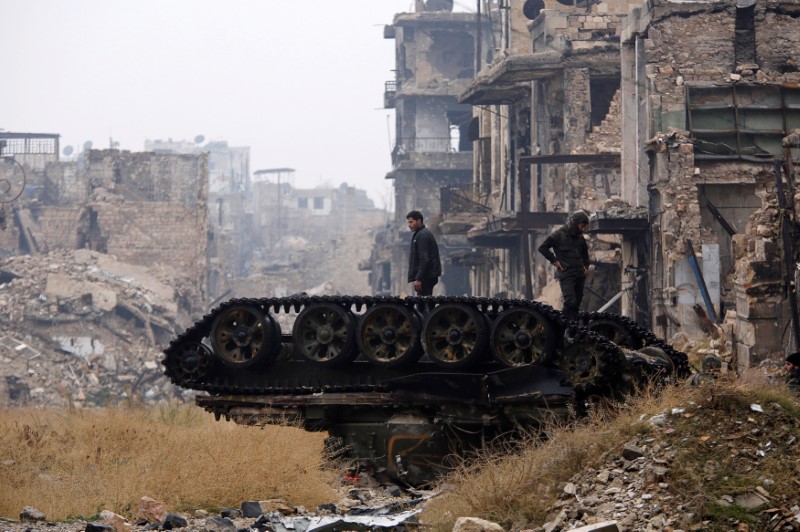By William Maclean
RIYADH (Reuters) - "Where are you, Oh Arabs, Oh Muslims, while we are being slaughtered?"
An old man's cry, in a video posted online from Aleppo's ruins, poses an uncomfortable question for the mainly Sunni Muslim Arab states backing rebels fighting President Bashar al-Assad and his allies Iran and Russia.
For Saudi Arabia, locked in a regional struggle with Iran, Assad's capture of the rebel haven reflects a dangerous tilt in the Middle East balance of power toward Tehran.
Dismayed by this boost to Iranian ambitions for a "Shi'ite crescent" of influence from Afghanistan to the Mediterranean, Riyadh is determined to reverse Tehran's gains sooner or later.
Countering Iran, buoyed by its 2015 nuclear deal with world powers, remains central to Gulf Arab policy but it is not clear how this might be achieved, especially when other concerns are multiplying.
Beset by low oil prices, at war in Yemen, and ties with Egypt strained, Riyadh and Gulf allies are questioning how much armed help they should now give the rebels, diplomats say.
The monarchies are frustrated with President Barack Obama's light touch approach to the war - relying on local fighters instead of large U.S. military deployments or missile strikes.
President-elect Donald Trump poses an intriguing contrast.
"MAKE A DEAL"
Seen as more decisive than Obama, Trump's choices of James Mattis, a retired Marine general distrustful of Iran, as Defense Secretary, and oil man Rex Tillerson as Secretary of State, have pleased Gulf Arab energy exporters.
But much remains uncertain, not least Trump's admiration for Russian President Vladimir Putin, an Assad ally.
"What we have learned from the U.S. election is to wait for actions, not words," said former Saudi intelligence chief Prince Turki al-Faisal.
A senior Western diplomat said Saudi officials were curious to see how Trump translates into policy his campaign criticism of Iran and his praise of Putin.
Saudi Foreign Minister Adel al-Jubeir said he had spent time in the United States to sound out the next administration.
Officials said Gulf states were asking Trump associates about Syria, to assess whether he would pursue a U.S.-led effort with Gulf states, Turkey and Western nations to arm the rebels.
Trump has indicated he may abandon the rebels to focus on fighting Islamic State.
Gulf Arab states want to test that view, said one Western official. A Gulf state foreign ministry official described Trump as "a businessman with whom you can make a deal".
RELIEF WILL STILL FLOW
Gulf humanitarian aid will remain: Sunni Arab societies will not accept curbs on relief to the mostly Sunni country, after a war that has forced 5 million Syrians to flee and killed 300,000.
But the extent of their armed support appears in question.
Qatar, with Saudi Arabia the most enthusiastic backer of the rebels, says it would prefer to continue military aid but insists this should remain a collective effort.
Proclaiming "great faith" in Trump, Asaad al-Zoubi, Saudi-based chief negotiator for the main opposition body, the High Negotiations Council, said some rebel backers had met Trump advisers to explain their cause. "They did not receive an answer from Trump's people. They (the advisers) wanted to listen more than they wanted to answer," he said.
Sami alFaraj, a security adviser to the Gulf Cooperation Council of six Gulf Arab states, told Reuters that the Gulf countries "need to regroup, have a strategic pause and look at how we pursue our objectives in the time ahead."
"The Syrian case has not been closed," he said. They would push for a transitional administration in Syria - something neither Assad nor Tehran accepts.
LEVERAGE
Any notion of Gulf Arab leverage in future negotiations seems far-fetched, given the determination of Assad, Moscow and Tehran to carve out territorial gains.
But Jubeir told the Arab League in Cairo that if world powers failed to constrain Assad there would be no political solution to the war.
"If we cannot find an effective way to pressure the Syrian regime, we will not reach a political solution and the killing, displacement, and injustice in Syria will go on," Jubeir said.
While drawn to Trump, the Gulf monarchies feel his views are not fully formed, and they want to do nothing that might cause him to harm their interests.
AlFaraj said he expected Trump to deal favorably with Gulf states, which have the wealth to help create U.S. jobs. He believed a suggestion by Trump that Gulf states pay for safe zones in Syria was worth considering.
"If he wants to create jobs there is no better field than selling weapons," alFaraj said. "We are the only people who have surplus cash."
However, Arab resentment at Western inaction over Syria appears deep and enduring.
Sheikh Khalifa bin Salman al Khalifa, foreign minister of Bahrain, an ally of Riyadh, told Reuters: "The whole thing in Syria was because of disengagement from world powers about how to deal with the matter. So with all the changes in the political leadership (in the West) let's hope for some new commitment for Syria."
Asked if it was realistic to back rebels who had lost their major urban stronghold, he replied: "Do you think its realistic that we should also allow such bloodshed and people dying to go on and on and on. What's the next city after Aleppo?"
